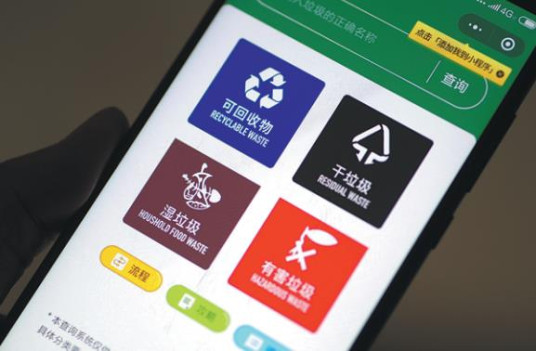Recycling urge paves way for creation of rubbish-related apps
 |
|
A mobile app that can assess what type of trash an item is. [Photo provided to China Daily] |
New recycling trends in China are paving the way for hundreds of waste-related applications, which industry insiders believe will spur a billion-dollar market over the next few years.
While Fang Fang, a 27-year-old financial clerk from Shanghai, is unsure if a lobster is dry or wet trash, an app has put an end to her confusion.
Using text input or an uploaded image, the app can assess what type of trash an item is in seconds.
"I don't need to spend so much time classifying rubbish every day. I can also find the answer whenever and wherever I want," said Fang.
Fang is among 24 million people in Shanghai who are benefiting from such apps. And the figure is set to grow with major cities including Beijing and Guangzhou disclosing plans to promote rubbish recycling.
This growing demand has prompted a string of apps to emerge. Though figures are not available showing how many apps there are in the country, there are at least 200 mini programs related to waste classification and recycling within Tencent's WeChat.
Alipay, the online payment subsidiary of Alibaba Group, told China Daily that more than 60 independent app developers have applied to develop and offer related programs on the platform, attracting more than 1 million new users within three days after the policy was launched.
According to Zhu Chunyong, head of city services at Alipay, the company itself launched a rubbish classification function recently in the app.
"Our system leverages augmented reality, which can identify objects more accurately than others," said Zhu, adding that the new function has attracted more than 3 million people within a week.
Zhang Xiaowen, deputy head of investment at Everbright Financial Holding Asset Management Co Ltd, said China is expected to generate a huge sanitation industry worth 200 billion yuan ($29 billion) in the coming years.
"The amount of solid waste recycling in China is only one-third of that in the United States and less than 30 percent of related industries are commercialized in the country," said Zhang at a salon held by Ran Caijing, a financial media startup.
"Therefore, China's solid waste-related industry is still at a decentralized stage. There is huge potential for integration and development in the future," he said.
Fang Hao, CEO of Xiandou Recycling, a Beijing-based startup, said "a string of waste classification and recycling companies will emerge over the next five years".
Currently, there are many "back-end" companies processing waste but not many "front-end" companies doing recycling, he said.
Fang said it is not enough to have businesses that recycle rubbish, it is also important to be able to transport and deal with it.
"Without a huge system of processing and dealing with garbage, classification is meaningless," he said.
Industry insiders said many challenges still remain for related businesses, including a lack of supervision and licenses.
Currently, processing garbage in China requires a license, which includes different categories such as kitchen, domestic, and construction waste removal.
"Also, people are still passive participants," said Yang Guisheng, a senior partner at leading law firm Dentons. "While people are still at an early stage of habit cultivation, the government plays an important guiding role."
He said that related rules and regulations should be formed gradually during this process.
"With rules being set, problems related to licenses, land use and whether work should be undertaken by State-owned companies or private ones can all be solved," he said.
